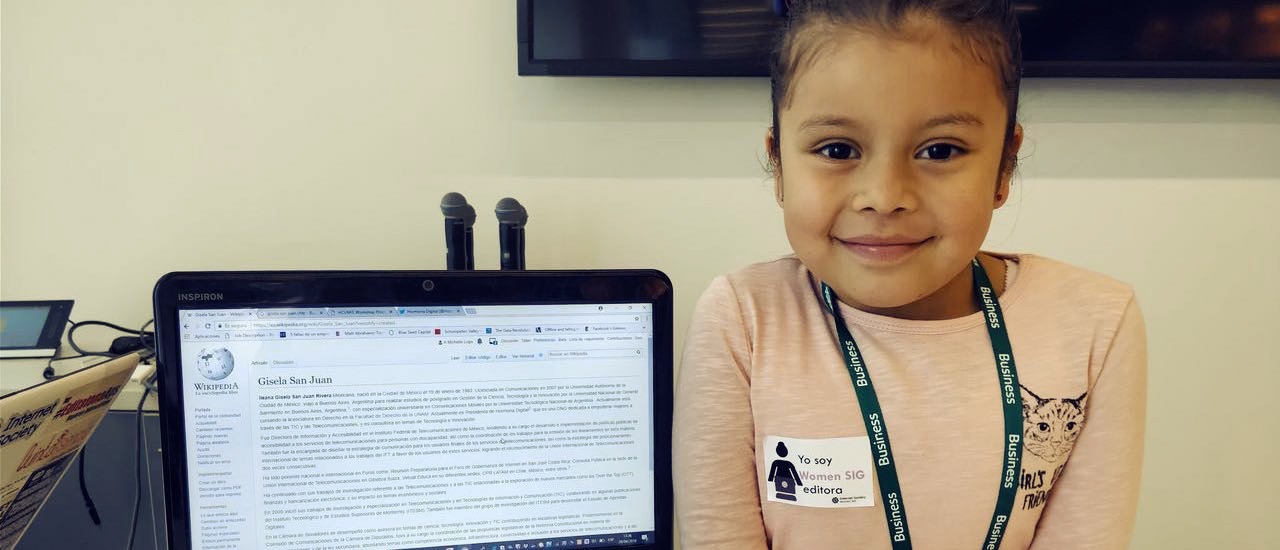Why is it necessary to “edit” the biographies of women who are doing an incredible job on issues of technology and the Internet? Simple: the contributions of these women do not have visibility on the Internet.
At many Internet Governance forums, we often highlight the contributions of the founding fathers, but how do we inspire girls to join ICTs – information and communication technologies – if we never mention women?
For this year’s International Girls in ICT Day, the Internet Society’s Special Interest Group for Women organized the 1st Global Editathon Girls in ICT. With the support of Chapters and organizations from all around the world, this initiative had a clear goal: to create local content written about and by women to make their work in technology visible.
Read about the Editathon on Twitter!
Only 17% of the Wikipedia content is about women and approximately 8.8% of the content in Wikipedia in Spanish is about women scientists. Where are those women who make a difference in science and technology? Do they exist? Of course they do!
“First Global Editathon Girls in ICT, was a huge experience for us, especially because Cape Verde could participate in this event.
We had a chance to put together women’s work and promote the ICT in our country, before we started we introduced ourself, our experience, our work, our expectations, our vision for the future of our country, this allowed us to know better our ICT women (not all of them), their project, and work.”
– Emilia Monteiro, República de Cabo Verde
We started the day in Islamabad and with a virtual node of women in South Asia. We continued south, this time of Africa, in Zimbabwe, and we continued in Tanzania, Kenya, Republic of Cape Verde, and Namibia. After crossing the Atlantic Ocean, we arrived in Latin America, where the day began in Buenos Aires, then Panama City and Lima. After heading to Mexico City we concluded the day very close to the Gulf of Mexico in Xalapa, Veracruz. About 300 women participated in the event which had 11 nodes in 10 countries. Computer labs, universities, and institutes were the venues chosen for this Editathon. Even individually or in teams, the participants created a total of about 70 biographies of women from their region.
“Participating in the global Editathon was a great experience. The people I chose to write about are two exceptional women who have made a difference in the country for their work, convictions, coherence, and integrity. I learned a lot from this experience, in particular, that a trajectory is not built overnight and behind each step made there is much work and learning previously done, as well as commitment to specific causes or objectives.”
– Karina Martínez, Mexico City
Only 1 in 10 Wikipedia editors is a woman. In this Editathon we learned not only to edit, but also the confidence to create content we think should be online. By creating and sharing these biographies of women we are inspiring more girls to pursue these paths.
While editing, we had the chance to know the work of many women, from different countries and regions, including:
Katitza Rodriguez
Debjani Ghosh
Kathy Brown
Maria Zaghi
Clara Luz Álvarez González de Castilla
The question of why we don’t make their work visible has become more urgent than ever. Where are these women in events with mostly men at panels? Because of the invisibility that exists for women in technology, we still believe that talking about technology is talking about men.
The task was not simple. It required the support of many people who joined this great project, first to make visible these women who are making a difference in ICT who are not on Wikipedia, second to gather information and organize nodes in their countries.
The challenge now is inviting more women to participate, interviewing other women, listening to each other and listening to them at events. We need to know more about these women. Let’s continue editing, creating, and disseminating their work. If we are not the ones who write about other women and encourage others to do the same, who will?
We need to be able to inspire girls to be engineers, mathematicians, programmers, and leaders and one way to achieve this is to get to know these “super women” who have worked hard so that today we can study without prejudice.
Our thanks to all those who joined: the Chapters that organized face-to-face nodes, the organizations and universities with which we teamed up, the Wikimedia Foundation for their advice, ICANNWiki for helping us with the workshop, and all those who supported us and participated in this incredible event. Thank you.
For an Internet to exist for the good of all people, it must be shaped by each one of us. Learn about Internet Governance and why every voice matters.
